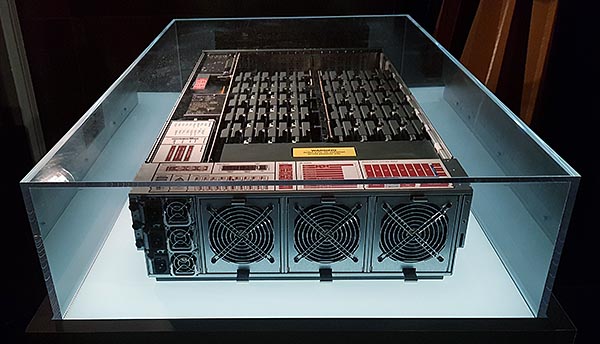Russian storage Tatlin at 19.5 petabytes is certified to store data according to the law of Spring

Tatlin storage system
The largest revenue by an IT holding in Russia, the National Computer Corporation (NCC) has joined forces with the state corporation Rostec to market data storage systems (DSS), which can be used to comply with the norms of the “Spring Law”. Potentially, this promises huge revenues from the sale of domestic equipment. Operators will be offered to install certified systems based on the new Tatlin storage system (pictured), which was presented in October 2017 by the Russian company Yadro (KNS Group LLC, a subsidiary of NKK, the company's blog on Habrahabr).
RBC Sergei Ovchinnikov, CEO of Norsi-Trans, one of the country's largest producers of operational investigative systems (SORM), told RBC about the cooperation between the NCC and Rostec.
According to him, a “special implementation” of the Tatlin storage system under 374-FZ is being created. Capacity for the production of these storage systems in large quantities is at Rostec. The system is very advanced; storing petabytes of data will not present a problem. See Tatlin storage specifications here .
Specifications 

According to the documentation, the platform supports connecting up to 1,632 disks, and the maximum capacity of each storage system is 19.5 petabytes (19,584 TB).
Hybrid storage system with a unified access protocol (Hybrid Unified Storage) allows connecting various drives: NVMe / SAS SSD and SAS / NL-SAS / SATA HDD, provides for “deep parallelization of I / O operations”, has a “legacy software free stack "code" and software architecture on container microservices. The three main components of the architecture are the PCIe fabric controllers, storage controllers, and disk chassis. High performance is achieved thanks to a duplicate coherent non-volatile cache up to 2 TB with a delay time of 200 ns and hardware accelerated data processing using a microcontroller based on the MIPS64 architecture.
Instead of outdated RAID technology, data integrity is provided by its own protection mechanisms based on Reed-Solomon codes with minimal redundancy. In a corporate blog on Habré, the company published a cycle of two articles about Reed-Solomon codes: 1 , 2 .
Other articles of the company in the corporate blog that may be relevant in connection with the production of equipment for the execution of the law of Spring: " Our method of calculating the stack of printed circuit boards ", " Testing at the factory:" Black box "and a short testing cycle ", " A few words about testing complex hardware complexes ".
Judging by the blog, the company really designs its own boards, tests them and manufactures, then sending the order to a Chinese factory. The company purchases clock generators, voltage regulators, network controllers, PCI Express switches, redirectors and other components from suppliers and assembles their systems based on them.
Although now the boards for storage are made in China and Taiwan , but in principle, the developers believe that all production can be transferred to Russia: “From the point of view of manufacturability, we have fairly ordinary boards. We're not doing iPhones. I think almost all of them can be done in Russia from a technical point of view. We have one gloomy [fee], but its gloom lies exclusively and only in the length of 700 mm - few people have such a workpiece and problems with soldering (it jars) and with drilling - the accuracy leaves for a long time, ” says an employee of asmolenskiy in the comments on the article.
To implement the project, NCC and Rostec created a joint venture called National Technologies LLC: the Rostec project is implemented by the Avtomatika Concern (51% of the joint venture’s shares), and the NCC subsidiary is KNS Group LLC ( under the brand Yadro, 49% of the shares). The head of the joint venture is Konstantin Yunov, the former IT director of MegaFon and the former deputy general director of the National Center for Informatization (part of Rostec).
Representatives of "Rostec" commented that the first joint venture joint venture officially announces in I quarter. 2018 year.
According to the package of anti-terrorist amendments of the deputy Irina Yarovaya and Senator Viktor Ozerov, from July 1, 2018, communications operators and organizers of information dissemination on the Internet (ARI), including e-mail services, instant messengers, forums, will have to keep call records and correspondence for up to six months its subscribers and users.
In the first six months of 2017, imports of storage systems into the Russian market amounted to about $ 127 million (230 petabytes). Among the leaders are Hitachi Data Systems, Hewlett Packard Enterprise, Huawei. After the law comes into force, the Spring volume of the market can grow many times over.
According to RBC, the cost of storage Tatlin with a maximum capacity of 19.5 petabytes can range from $ 7.8 million to $ 11.7 million.
All Articles